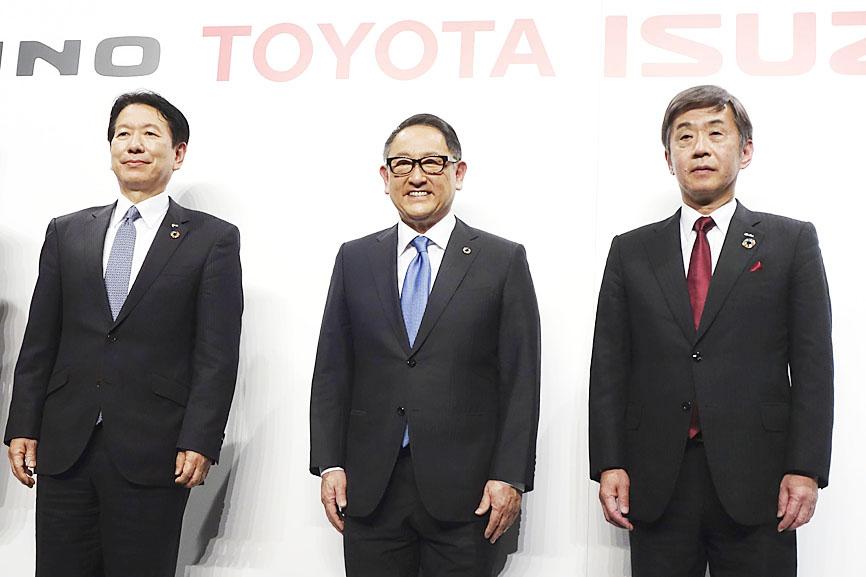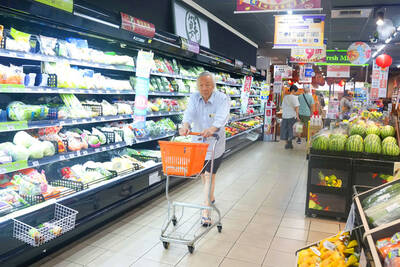Japanese automakers Toyota Motor Corp, Isuzu Motors Ltd and Hino Motors Ltd yesterday said that they are setting up a commercial vehicles partnership to work together in electric, hydrogen, connected and autonomous driving technologies.
Under the deal, Toyota, Japan’s top automaker, and truckmaker Isuzu would each take a 4.6 percent stake in each other, the three companies said in a joint statement.
Hino is Toyota’s truck division and was Isuzu’s rival.

Photo: AP
The 39 million shares of Isuzu common stock that Toyota is acquiring are worth ¥42.8 billion (US$393.1 million).
Isuzu would acquire Toyota shares worth the same value, they said.
The three companies combined control 80 percent of the Japanese truck market.
Toyota, which makes the Camry sedan, Prius hybrid and Lexus luxury models, in 2018 sold off a 5.9 percent stake in Isuzu that it had bought in 2006. Earlier, Isuzu had a capital tie-up with US automaker General Motors Co.
Toyota, Isuzu and Hino aim to reduce emissions by building hydrogen infrastructure, and help solve the nation’s shortage of drivers by sharing information online and making deliveries more efficient.
“These days, it is hard to discern what is the correct way, and so we just have to give it a try, and then try again. It is through that process of repetition Toyota has achieved what it has,” Toyota president Akio Toyoda told a news conference that streamed online.
The three companies plan to develop electric vehicles, fuel cell vehicles, autonomous driving and electronic platforms for trucks, allowing them to cut costs), as well as promote ecological infrastructure and boost traffic safety.
“Companies must take up innovation if we hope to build a better society,” Isuzu president Masanori Katayama said.
Apart from their mutual stake holdings, Isuzu, Hino, and Toyota are jointly setting up a company, called Commercial Japan Partnership Technologies Corp in Tokyo, to promote their partnership and plan technology and services, the company presidents said at an online news conference.
Capitalized at ¥10 million, the new company would be 80 percent owned by Toyota, and 10 percent each by Isuzu and Hino.
“This new framework is a certain step toward helping solve society’s challenges,” Hino president Yoshio Shimo said.
A key project in the Toyota-Isuzu-Hino tie-up is introducing fuel cell trucks for a “hydrogen-based society” model being developed in Fukushima Prefecture, which was hit by the tsunami, earthquake and Fukushima Dai-ichi nuclear power plant disaster of March 2011.
Toyoda said that every March since then, he has gone to northeastern Japan to commemorate the three disasters. This year, he visited Namie in Fukushima, which is still contaminated by radiation.
He said that he hopes the hydrogen society efforts will contribute to rebuilding the region.

On Tuesday, US President Donald Trump weighed in on a pressing national issue: The rebranding of a restaurant chain. Last week, Cracker Barrel, a Tennessee company whose nationwide locations lean heavily on a cozy, old-timey aesthetic — “rocking chairs on the porch, a warm fire in the hearth, peg games on the table” — announced it was updating its logo. Uncle Herschel, the man who once appeared next to the letters with a barrel, was gone. It sparked ire on the right, with Donald Trump Jr leading a charge against the rebranding: “WTF is wrong with Cracker Barrel?!” Later, Trump Sr weighed

SinoPac Financial Holdings Co (永豐金控) is weighing whether to add a life insurance business to its portfolio, but would tread cautiously after completing three acquisitions in quick succession, president Stanley Chu (朱士廷) said yesterday. “We are carefully considering whether life insurance should play a role in SinoPac’s business map,” Chu told reporters ahead of an earnings conference. “Our priority is to ensure the success of the deals we have already made, even though we are tracking some possible targets.” Local media have reported that Mercuries Life Insurance Co (三商美邦人壽), which is seeking buyers amid financial strains, has invited three financial

Artificial intelligence (AI) chip designer Cambricon Technologies Corp (寒武紀科技) plunged almost 9 percent after warning investors about a doubling in its share price over just a month, a record gain that helped fuel a US$1 trillion Chinese market rally. Cambricon triggered the selloff with a Thursday filing in which it dispelled talk about nonexistent products in the pipeline, reminded investors it labors under US sanctions, and stressed the difficulties of ascending the technology ladder. The Shanghai-listed company’s stock dived by the most since April in early yesterday trading, while the market stood largely unchanged. The litany of warnings underscores growing scrutiny of

OUTLOOK: Among the six sub-indices, only the stock market confidence sub-index rose due to strong equity performance and expectations of a US Federal Reserve rate cut Consumer confidence weakened further this month, sliding to its lowest level in two-and-a-half years as households grew increasingly uneasy about the economic outlook, job security and big-ticket spending, a survey by the National Central University showed yesterday. The consumer confidence index fell 1.07 points from last month to 63.31, the weakest number since May 2023, said the university’s Research Center for Taiwan Economic Development (RCTED), which conducts the monthly poll. “Although the Directorate-General of Budget, Accounting and Statistics recently increased Taiwan’s GDP growth forecast for this year to 4.45 percent, consumer sentiment tells a different story,” RCTED director Dachrahn Wu